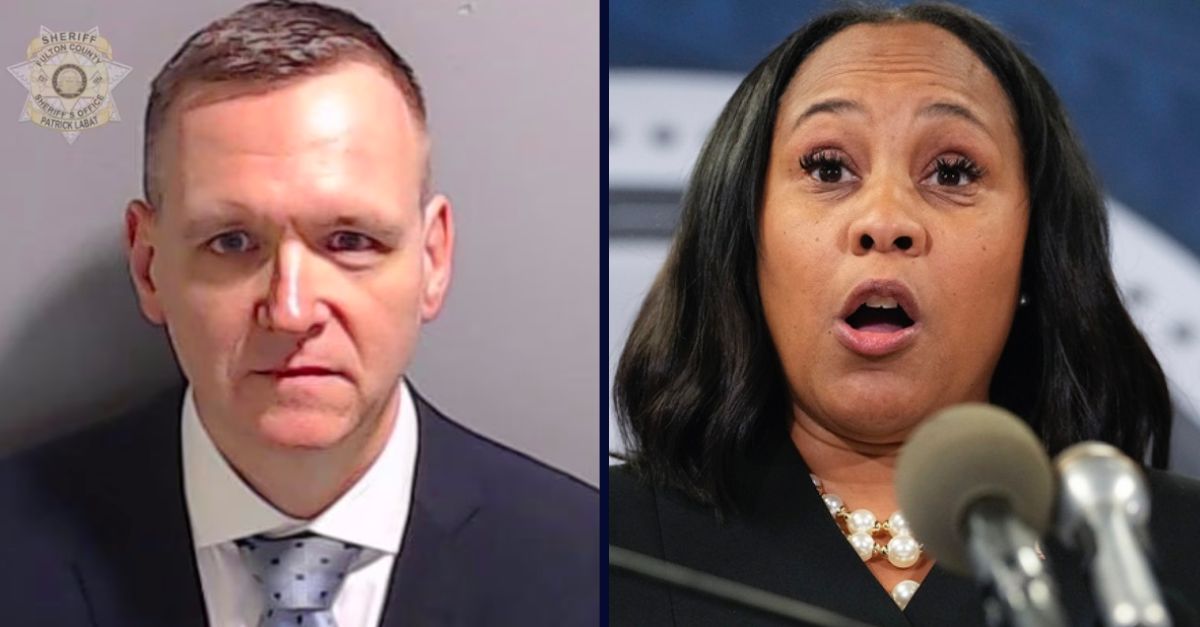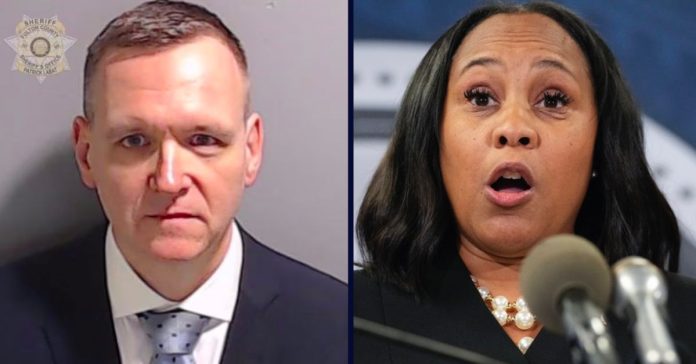
Left: Michael Roman; Right: Fulton County District Attorney Fani Willis speaks on Aug. 14, 2023, in Atlanta (Fulton County Jail mug shot; AP Photo/John Bazemore)
Fulton County District Attorney Fani Willis and special prosecutor Nathan Wade lied about their relationship, according to a Friday court filing by a co-defendant in the racketeering (RICO) and election subversion case against former President Donald Trump and others.
Attorneys representing Michael Roman, a staff member for Trump’s 2020 reelection campaign, made the allegations in a 122-page supplemental reply to last week’s response by Willis, which acknowledged she is in a “personal relationship” with Wade — but insisted there was nothing untoward about their romance.
The latest Roman filing, prepared by Marietta-based attorneys Ashleigh Merchant and John Merchant, directly disputes claims about the timeline of the relationship made by the DA’s office as well as a sworn affidavit from Wade attached to the earlier Willis filing.
In early January, Roman first publicized the allegations against Willis and Wade in a headline-generating motion arguing the prosecutorial duo should be disqualified from the case due to a “conflict of interest” because of their alleged self-dealing, nepotistic relationship.
Since then, six other co-defendants in the case, including the 45th president, have signed on to Roman’s motion, alleging that Willis has engaged in various conduct that should result in her being removed from the case — and the dismissal of the indictment entirely.
A hearing over those allegations is slated to be held on Feb. 15 before Fulton County Superior Court Judge Scott McAfee.
The timelines
“Willis and Wade claim they did not have a personal, romantic relationship before Willis appointed Wade as a special prosecutor, but Terrence Bradley will refute that claim,” the Friday filing reads. “Bradley is an attorney and a member of the Georgia Bar. Bradley and Wade were friends and business associates. Bradley has non-privileged, personal knowledge that the romantic relationship between Wade and Willis began prior to Willis being sworn as the district attorney for Fulton County, Georgia in January 2021.”
Last week, the DA’s office claimed “there was no personal relationship between” Wade and Willis “in November 2021 at the time of Special Prosecutor Wade’s appointment.” The sworn affidavit echoed that claim — saying their personal relationship “developed” in 2022.
“Mr. Roman believes the special prosecutor’s statement in his affidavit that the relationship did not start until 2022 is patently false,” the latest Roman filing reads in a footnote early on.
In a terse initial reply, Roman’s defense counsel previewed Friday’s filing. That first reply noted the defense intends to depose witnesses with “personal knowledge that Wade and Willis’ personal relationship began before his appointment as a special prosecutor.”
At least one such witness, it appears, is Bradley. Roman’s latest reply also appears to anticipate what would likely be a challenge to Bradley’s testimony based on attorney-client privilege.
“Bradley obtained information about the relationship between Wade and Willis directly from Wade when Wade was not seeking legal advice from Bradley,” the newest filing reads. “Bradley obtained this information in a personal capacity as Wade’s friend prior to Wade’s decision to file for divorce. While Bradley would later represent Wade for a time in his divorce proceeding, the information about the relationship was obtained prior to any attorney-client relationship beginning, and none of Bradley’s testimony will relate to any privileged attorney-client communications or work product.”
The trips
Destination vacations and other forms of travel — and associated expenses — have formed a key aspect of Roman’s complaints about the alleged self-dealing relationship between Willis and Wade.
Roman, through his attorneys, has accused Wade of purchasing “tickets for both of them to travel on both the Norwegian and Royal Caribbean cruise lines,” an extension of the argument that Willis has benefited from the public funds used to hire her “boyfriend.”
Willis responded to the travel allegations by claiming “personal travel taken is divided roughly evenly between the two,” that neither she nor Wade is “primarily responsible for expenses of the other,” and that their expenses are “paid for with individual personal funds.” Wade, in his affidavit, mirrored those claims, writing: “expenses for personal travel were roughly divided equally between us.”
In Roman’s prior filings, the co-defendant detailed trips Wade and Willis made together to Napa, Miami and Aruba.
The latest filing also contains allegations the pair traveled together to the Bahamas and Belize — with Wade allegedly spending well in excess of $6,500 on those two trips, including $74.15 at a tattoo parlor. In sum, the latest filing details spending by Wade for travel with Willis north of $15,000 over eight months in late 2022 and early 2023.
And, Roman suggests, that’s not all.
“The foregoing trips surely are not the only payments Wade has made that have personally and financially benefited Willis,” the Friday filing alleges. “If, as Bradley confirms, Willis and Wade were in a romantic relationship before she even took office, Wade likely provided Willis with significant other gifts and benefits.”
The treasure trove
The latest Roman filing muses about the “right to a fair trial is not trivial and it was not an afterthought or a catch phrase.”
The allegations against Wade and Willis, Merchant claims on behalf of her client, are in service of this fundamental constitutional principle.
“It is evident that the district attorney and her personally-appointed special prosecutor have enriched themselves off this case,” the filing reads. “That enrichment has taken various forms, not the least of which is incredible amounts of money paid to Wade by Willis that has, in turn, resulted in Willis’ personal financial benefit in the form of vacations, hotel stays and the like that have nothing to do with this case or her official duties as a prosecutor.”
According to the filing, Wade has “irregularities in his invoices,” and he has been paid “significantly more than the amounts billed by the other two special prosecutors” who are on the RICO case.
“This enrichment is a form of self-dealing, which creates a personal interest in this case,” the filing goes on. “In other words, the more work that is done on the case (regardless of what justice calls for) the more they get paid. The more they fight Mr. Roman’s motions, the more they get paid. The more they refuse to dismiss defendants who should not be indicted, the more money they make. And, of course, the more money the special prosecutor makes, the more the district attorney gets to reap the financial benefits.”
Law&Crime reached out to Willis’s office for comment on this story, but no response was immediately forthcoming at the time of publication.
Have a tip we should know? [email protected]

